
Timelessly dealing with crucial mis-communication issues in families. (Here: single parenting, too)
In a way, the title "Snow Flower" symbolically refers to a time when the love of the protagonist´s parents was still full of happiness. However, the KDrama actually comes along as a study about communication difficulties and misunderstandings between a single mother and her young daughter where the daughter is struggling with the question: why can't she grow up with mother AND father, like other children do? There must be someone to blame for this – The father? The mother? Or even herself... "Snow Flower" dates back to 2006, yet dealing with crucial educational issues in a timeless manner.In KDrama style, the story is enriched with a variety of dramaturgical colors. However, the sticks and stones are (unfortunately) not all absurd. This and That may be culture specific, but overall I think "Snow Flower" offers a wonderful (though not so fun to watch) study about mis-communication, which are (varying in intensity and severity) experienced by many families (and relationships) all around the world. Go Ara won Best Actress at Baeksang Arts Awards, i.e. for her great performance as a rebellious daughter. At her side strong as usual: Kim Hee-ae.
SBS tackled a topic that washes unloved laundry, because in South Korea family issues in education are a private matter, happening behind closed doors and being nobody's business. Actually, the family here is quite progressive. The mother is a single parent and successful writer, dating an art professor. Two neighbouring families, with their doors always open for each other – practically an extended family with no room for secrets.
Yet, a progressive attitude towards life alone has very little to do with the communication traps in family life. The mother falls into these traps, and so does the daughter, having inherited her mother's temperament. It's sometimes painful to witness, how one or the other keeps reacting to another and another red flag, blindly fighting back within seconds and thus creating conflicts that cannot be resolved, as the explosion has already been set off before communication is possible.
The offering of this KDrama: while we have to listen to their fights, we are also do participate here and there, in what they are quietly thinking and feeling, too. Thus, "Snow Flower" does not ONLY want to stage DramaDramaDrama with this conflictual mother-daughter relationship, but is also committed to an educational mission. (You may also want to check the side note below.) The background is embedded in the world of the filming industry and rooted in the handicap of single parents and divorced families.
So in "Snow Flower" the deeply disappointed and insecure daughter pushes her thing through, while the mother doesn't succeed in letting go of her well-meant (those are the worst) templates. Up to the bitter end. That's impressive. Startling, too.
p.s.:
Some may say – and I agree – the mother-daughter communication is most of the time so off the charts. It's scary sometimes. Nevertheless and actually because of that, (in my opinion) the script and the actresses do their job quite well. (However, one does not have to like it...)
Due to the given occasion: here is a side note on the communication problem between Dami and her mother, which (unfortunately) many families struggle with more or less severely. (By the way, as such conflicts are happening within the ´best´ families, professional coaching is available – and might have been a solution for Dami and her Mom, too.)
------------------------------------------------------------------------------------------------------------------------------------
SIDE NOTE --- on the widespread communication problem between parents and children ---
Even though opposition is rather due to attitude, position or opinion and is nothing personal as such, emotionally this can be hardly distinguished in the heat of the moment. How liberating it would be, if both parent and child would listen carefully, ask questions, and try to reach mutual understanding. Some call it communication…
In many conflicting situations, it is first and foremost about being noticed and understood by the other person. Thus you have to show yourself. Self-confident in who you are and what you want or are afraid of. As a result, the conflict resolution in the matter is actually not that difficult anymore.
Win-win, so to speak.
(Easier said than done… Most of the time, a more or less pronounced self-doubt, for example a thorn of guilt or inferiority, subtly gnaws at the foundation of a sincere, self-confident presence - in parents and children alike.)
However we my look at it, most of the time we have to do something for mutual understanding. Yet, more than other relationships, mother and daughter are probably predestined to believe that they can take this 'understanding' for granted without a process of understanding – after all, it is about 'their own flesh and blood', isn´t it.
Incorrect! These are two individual people with their own will, their own memory, their own experiences, their own desires and their own interests. Blood/love aside... Thinking that you know the other person well does not replace the need to invest time, patience and a willingness to cooperate in understanding again and again.
'Are you making a relationship statement here?', ´Are you trying to be practical?'. ´Is that a request?´, ´Do you actually want to reveal something about yourself right now?´, ´What do you want?´, ´What do I want?´ … All this requires consideration. Again and again! And 'again and again' means, strictly speaking: 'often' or even 'constantly'. After all, parents and their children usually share the apartment, show themselves without make-up in many respects, see each other first and last every day and plenty in between. There are many chances of contact/friction. Annoying communication can get on your nerves, yes. You have no time, you are stressed already, you are not in the mood...
Consequently we mostly choose a quick judgement, because that is more economical. A preconceived notion, a prejudice that doesn't seem worth trying to test. But in doing so, we might be hardening the fronts, and thus the roller shutters go down. There is no forward (e.g. solution) and no backward (e.g. bonding). Lose-lose, so to speak.
"Snow Flower" impressively portrays how such confirmedly unresolved conflict situations encourage the child (here the daughter Dami) to finally repay the parents (here the mother) at some point. This crucial moment was actually (as so often) triggered by a key event.
Suppressing her need to be close to her mother and to wanting to feel connected and loved, Dami now deliberately treats her mother the way she FEELS treated herself (without having confirmed any of that, of course). The need and longing hasn't gone away. It's just relegated to an unconscious level for the time being. Consciously and outrageously she rather strikes back in defiance, deliberately wanting to hurt – just as she feels hurt. "I don't do any university entrance exams". "I don't even want to study." "Then I'll just move out." And underneath (pronounced or not) linger disappointment and self-doubt, e.g. "I'm probably not worthy of being loved." "It would be better if I didn't exist at all"…
Dami navigates between the roles of perpetrator and victim and doesn't get what she actually wants in either of them. Yet, both are ROLES, and not her true SELF.
Additionally, in her newly discovered role as a perpetrator Dami even worsens the situation in an almost fatal way, because such a defiant reaction is considered extremely immature by parents. In the case of Dami´s mother, this inevitably leads to the conclusion that she should actually take more even control. However, by boldly taking her parenting responsibilities back into her hands, she only adds fuel to the fire.
The past that led to this dilemma is long history for both of them. Both feel they did their best. In terms of communication, however, this is not the case. They may have 'meant well' for the sake of peace, but they didn't communicate what´s actually on their MIND. Well, what´s on my mind is 'Mine' and not 'Yours', until I let you know.
To disagree is not the problem. Different perspectives and intentions are normal. Unfortunately, a cooperation oriented process of communicating is not...

A story full of humanity in the face + despite blatant inhumanity. An epic about love & compassion
"Eyes of Dawn" marks a quite spectacular milestone for South Korea Television Series as well as the kick off for a new era of TV production – ambitious in terms of time sensitive content as well as an artistically valuable approach. The production dates back to 1991… South Korean life is just cautiously starting to be a bit less suppressed."Eyes of Dawn" is the creative script and cinematic processing of a novel, which deals with the tragic relationships of the three protagonists Choi Dae-chi, Yoon Yeo-ok and Jang Ha-rim as well as the bitter history of their time. The story takes place during the Japanese colonial rule, during the last years of the second world war and reaches up to the liberation of Korea and the time of the Korean War.
The KDrama begins its story during the last years of World War II – with Yeo-ok, a comfort woman, who like cattle is being shipped to northern Manchuria, and Ha-rim, who is drafted into the military as a student. Yeo-ok meets and falls in love with soldier Dae-chi, while serving as a comfort woman for his Kwantung Army unit. (With Ha-rim she only meets much later. )The world war and the subsequent struggle in Korea for a new political identity grind the three protagonists mercilessly through somewhat traumatizing mills. Love and passion accompany the three on their dramatically entangled paths, where they sometimes meet, sometimes separate, meet again and separate again within the turbulent swell of their time. Showdown is during the Korean War at Jirisan Mountain – in the ´eyes of dawn´…
For this KDrama MBC spent a lot of money – more than 5 times as much, compared to other TV series. It was shot at original or similarly exotic locations abroad. (If you like, see also the side notes below.) The project feels more like an approx. 36-hours-long movie. With "Eyes of Dawn" MBC celebrated its 30th anniversary with a bang, so to speak. The KDrama was enthusiastically received by the audience. For director Kim Jong-hak, "Eyes of Dawn" was the breakthrough. The former journalist came to MBC in 1977 and worked his way up the ranks with historical dramas in a politically turbulent time full of rapid changes (in series production, too). However, "Eyes of Dawn" is his first truly self-responsible of two innovative, groundbreaking masterpieces (the other being "Sandglass"). Thus, Kim has unsparingly reappraised the latest history of his country and his compatriots with a confident original signature and thorough, artitistic determination. At his side, screenwriter Song Ji-na provided a well-rounded, coherent script with depth and complexity. A team of talented actors and an intensely lingering soundtrack rounded off the ambitious projects with a high entertainment value.
Fantastic actors. The three leads in particular, but not just them. This applies to everyone else – there were an impressive 270 actors as well as around 21.000 supernumeraries involved...
"Eyes of Dawn" and "Sandglass" are actually both (in contrast, for example, to the younger KDrama "Faith or The Great Doctor", which Kim Jong-hak also had directed) reduced to the essentials when it comes to dialogues. Passionate, but also ruthless in the authenticity of sometimes ugly, even brutal details. Gross and austere, yet visually stunning, too. With selected camera angles that often say more than words, and scenes, that burn into your memory. The KDrama wants to show life as it was, back then... 'Nice' is rare. Sincere it is, though. Serious. A great piece of series culture. A dream of a historical drama, aiming at bringing history to consciousness in a memorable, authentic way. Thus, what happened is not forgotten. It is a cinematic monument: Take a look! Feel it! Recognize what happened! Estimate! (Too bad, it's not widely circulated with at least English subtitles... however, apparently there's a musical now... well... let´s hope.)
The story offers merciless insight into the suffering of the comfort women who, even as teenagers, were often brutally physically abused for the pleasure of the Japanese soldiers – a war crime that has not been adequately investigated and atoned for to this day. In principle, people of Chōsen were systematically oppressed back then. The Chōsen soldiers in the Japanese army, thus also had a particularly hard time, as the KDrama bluntly shows, too. And then there is the turmoil and ruthless brutality of diverse war sites in inhospitable locations around the Pacific Ocean, and later between brothers and sisters as the Korean Peninsula was coldly caught by the increasing Cold War. With the uprising on Jeju-do becoming part of the story, an up until then rarely discussed aspect of the late 1940s comes to mind. As well as another, often suppressed war crime that Japan had committed against its international prisoners in connection with Unit 731: mostly deadly ending medical experiments on several thousand men, women and children in one of the coldest places on earth, in northern Manchuria. (In case you didn´t know, you may see the side note below.)
But "Eyes of Dawn" is also a story full of humanity even in the face and despite all blatant inhumanity. An epic about love, friendship, connection and compassion. There were plenty of awards. I line up there. This KDrama production is particularly valuable…
(...especially from a historical point of view for me as a European. Although I did take history as an advanced course in school, I somehow had never considered a lot of these events and topics really seriously before. But even beyond its historically enlightening ambitions, "Eyes of Dawn" consistently and purposefully tells a powerful story about three (ordinary) people of their time and their tragic fates, complexly woven into an emotionally touching love triangle.
(For the sake of completeness: as this KDrama is from 1991, visual and acoustical quality obviously can´t be compared to recent standards...)
----------------------------------------
SIDE NOTE
--- Some background information on the Pacific War and the filming locations at the original historical locations ---
- War sites on the Chinese Mainland – Northern Manchuria
World War II began in Asia with Japan's invasion of China in 1937. The Second Sino-Japanese War was fought almost exclusively on the Chinese mainland until the end of 1941. Only with the Japanese attack on Pearl Harbour on December 7 in 1941 did it spread to the entire Pacific and had the US allies also intervening in the war against the massive Japanese expansionist policy. Thus, in the course of 1942, the balance of power shifted towards the USA. However, the warfare was difficult. The scenes of the battles were often in impassable swampy areas and rain forests, where tanks and heavy artillery could not be used. So there was a lot of fighting in the air and on the water. In November 1943, the Soviet Union also opposed Japan and opened a second front in Manchuria. The air for Japan was getting thinner and thinner. The army motivated their soldiers by employing 'comfort women', practically forcibly recruited from their colonies, who accompanied 'their' troops as sex slaves and had to ensure their good morale. Among them were minors, too (like the fictional Yeo-ok).
- In the jungles of Burma
In its large-scale campaign to conquer all of Southeast Asia, after the effective invasions of the Philippines, Indonesia and Malaysia, Japan was also able to take Burma in the spring of 1942. China was thus cut off from supplies. Starting from Ledo in British-Indian Assam, the USA had an extra supply road built through Burma's jungle – the "Ledo Road". In the meantime, the Japanese troops were pushing the British further and further back into the north of Burma, ultimately driving them out of the country for good and even pushing forward into India in a further offensive. The Japanese army had now themselves fallen victim to the lack of replenishment with supplies. They originally only had food for three weeks. After that they had to see for themselves. (These jungle fights become the operational area of the fictional Dae-chi.) In this context, in 1944 the fierce hand-to-hand combats at Imphal and Kohima south of Ledo marked a turning point in the course of the Second World War as the British reinforcements arrived just in time.
- Saipan: Strategically important Mariana island in the middle of the Pacific Ocean
In mid-June 1944, the US Marines landed on the south-west coast of Saipan in the bitter struggle for the strategically important island chain of the Mariana Islands in the Pacific Ocean. This also becomes the setting in "Eyes of Dawn", because Ha-rim is stationed in the field hospital here and Yeo-ok was also shipped there as a comfort woman.
Three weeks after the US Marines landed, the heavily fortified island with its three airfields was owned by the Americans. From here, the neighboring island of Tinian could also be taken, from where the atomic bombers in the direction of Hiroshima and Nagasaki actually started about a year later.
- From Liberation of Chōsen to Korean War
The Japanese surrender in 1945 was followed by the liberation of the Chōsen colony. Contrary to the Western view of this 'liberation' of Korea and the role of the USA in supporting/forcing a democratic South, which for me as a German is more Western, in "Eyes of Dawn" you get a non-Western portrayal. The post-colonial struggle of the people of Korean origin for their political sovereignty, previously stolen by Japan, began even before the (rest of the ) world recognized it as the Korean War in 1950. "Eyes of Dawn" portrays the time of the tussle between the USA, Russia and China on the one hand and the search for a new national Korean political identity on the other. The KDrama emphasizes this in a dramaturgically moving way using the example of the fatal triangular relationship between Dae-chi, Ha-rim and Yeo-ok in the back and forth of their pro- and anti-communist agent activities and in the service of the army of the newly installed Republic of Korea on the one hand and those who resist this government on the other partisan army on the other hand.
----------------------------------------
----------------------------------------
SIDE NOTE:
--- Jeju Uprising 1948/49 ---
A notable sequence in connection with the resistance against the US-sponsored Rhee government is the April 1948 to June 1949 uprising on Jeju Island. The KDrama had its scenes shot on location. Just consider, that at the time of the uprising almost every family on the island had probably lost someone, but for decades silence was officially decreed about this mass murder launched by their own (new South Korean) government. Surviving 'activists' were banned from working throughout South Korea. "Eyes of Dawn" is one of the first public confessions and the cautious approach to coming to terms with the past with regard to that dark first chapter of this young republic.
The USA categorically rejecting any kind of communist orientation regarding a political future as South Korea or all of Korea, were faced with plenty of riots and guerrilla actions in the course of the national resistance against an (yet again) unwanted paternalism. The uprising on Jeju Island is arguably one of the most shocking examples. After expressions of dissatisfaction with the planned elections for the US-sponsored government and resistance to renewed foreign rule, the population was ruthlessly massacred by the Korean army and the help of the US-Army´s occupying forces. The people fled to Hallasan mountain area while their coastal villages (270 out of 400) were destroyed. There is disagreement about the number of actual casualty – the numbers vary between 27.000 and 140.000.
In 1991, when "Eyes of Dawn" was broadcast, this topic had not yet been officially dealt with – but with this KDrama the uprising got an unmistakable voice and recognition for the first time. It was not until 1999 that the government convened a thorough investigation. In 2006, the government officially apologized. However, police and the Department of Defense only came up with an apology recently, in 2019.
-----------------------------------------------
------------------------------------------------
SIDE NOTE:
--- Region of Harbin in northern Manchuria and Unit 731 of the Japanese Kwantung Army, which experimented with biological and chemical weapons on humans and then used those on civilians as well ---
Japan had already secured influence in northern Manchuria during the course of the first Sino-Japanese War by building the South Manchurian Railway. The valuable raw materials mined here were transported to Chōsen and shipped from there to Japan. The railway was under the protection of the Japanese Kwantung Army. Between the first two world wars, Russia, Japan and China fought for supremacy in Manchuria. Eventually, with the Japanese occupation of this economically viable region in 1932, they established the puppet state of Manchukuo, with Harbin being its largest city. Here was the stronghold where Unit 731, led by Ishii Shirō, began their spooky experiments. At last, after the end of war, between 1945 and 1948, the Communist People's Liberation Army, strengthened by its anti-Japanese resistance concentrated its forces in Manchuria.
Surgeon General Ishii Shirō and his Unit 731 were busy starting 1932 in and around Harbin with experiments on living people. Around 3.000 mostly bacteriologists worked for Unit 731. An estimated 3.500 mostly Korean and Chinese civilians as well as Soviet prisoners of war were victims of their cruel human experiments.
The experiments of the Imperial Japanese Army's secret Kwantung Army Unit 731, disguised as the "Department of Epidemic Prevention and Water Supply Department" laid the groundwork for a wide variety of horrific war crimes during World War II. Among this ´research´, for example, were investigations concerning varying effects of grenades on the human body depending on distance and position, investigations into the effects of bombs filled with a variation of bacterial powders, of pest bacteria or anthrax bacteria, or bombs filled with fleas being contained by such bacteria. It has been proven that Chinese prisoners of war were given food that was deliberately contaminated with typhoid pathogens. During the final years of the war, around 130 kg of anthrax warfare produced by Unit 731 was used to contaminate lakes, rivers and wells on enemy soil. Finally US prisoners of war were 1943ff used for experiments of Unit 731, too. E.g., for research about the susceptibility of 'white' people to epidemics. During the course of the war, another tens of thousands of mostly civilians died from rat induced epidemics of plague, of anthrax and of typhoid pathogens as a result of ´field research´ and by the use of thus produced biological weapons, based on the 'medical research' in Harbin.
And for further information:
Unit 731 always had the full support of later Japanese prime ministers, and the Japanese imperial family was aware of it, too.
The main perpetrators of Unit 731, including Ishii Shirō himself, ultimately remained unpunished after the war crimes trials – in exchange for the research results that they handed over to the USA.
----------------------------------------------------
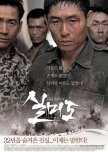
Secret SK military unit, drilled solely for assassinating Kim Il-sung, becoming victims of politics
“Silmido” is a KMovie that generated enormous public impact in South Korea. A 2003 production that used dramaturgical means to bring a previously unknown, small but rather blatant chapter of South Korean history to public awareness, that had long been kept secret and filed away. The KMovie “Silmido” had its mission fulfilled – at the box office, among the people and among those, who ultimately make decisions.“Silmido” was apparently more popular in South Korea than the Lord of the Rings trilogy or Titanic. To this day, the KMovie in South Korea is considered one of the most successful productions ever. The cast is first class. The focus is on the training camp for the secret military special unit 684 - its soldiers, its commanders, the training and living conditions. In the end we see where this all is leading to – this at that time particularly fatal involvement of the military with domestic and foreign policy, plus and foremost always at the forefront, yet hidden behind the curtain: the secret service.
The story is contrasting ambivalent attitudes towards feelings of national solidarity. On the one hand, an emotional patriotism based on the connection to one's personal origins and South Korean homeland, and on the other hand, a politically instilled national identity of “democratic South” against “communist enemy in the North”. On top of that: Unconditional obedience within the chain of command struggling with common sense...
Overall, it's about a brutal man´s military world. It is about hardline drilling methods. Yet , it is not about heroes and villains, nor about the good guys against the bad guys. Over time, the protagonists are increasingly gaining a profile, that shows some softer heartbeat, too. Camaraderie, bromance and respect for each other are in it as well. The showdown is rather disturbing.
PS:
Eventually the KMovie had its impact: in 2010, the central district court in Seoul ordered that the equivalent of around 188,000 euros in compensation should be paid out to the families of the former members of Unit 684 - the forgotten, denied unit that “Silmido” is about. The court comes to the conclusion after following public pressure and thus officially investigating the case: The Silmido soldiers had not been sufficiently informed about the hardship and dangers of the training camp, the training conditions had violated their basic human rights and the government at the time (1971) would have brought great suffering to the families of the bereaved by covering up the events.
---------------------------------------------------------
SIDE NOTE: --- Secret special Unit 684 ---
The film title "Silmido" refers to a very small, actually uninhabited island in the Yellow Sea, southwest of Incheon. Here (in response to the failed North Korean assassination attempt on South Korean President Park Chung-hee in 1968), between 1968 and 1971 a special military unit was trained at the instigation of the secret service, with just one goal: to eventually efficiently assassinate North Korean President Kim Il-sung. The circumstances surrounding Unit 684 are still not all clear. One thing is certain, though: the unit was created in April 68 (68-4) and trained in the utmost secrecy on the island of Silmido under almost inhumane conditions.
For the script quite some extensive research was done in advance. The story is based on rather thin officially existing information, added up with a few eyewitness reports, whereas gaps were filled with poetic freedom. For example, it is not clear how Unit 684 was actually recruited. However, among the specially trained elite soldiers there were obviously some with previous convictions, although not serious criminals. The KMovie ultimately decided to freely use a narrative that all the men were doomed criminals who, in their desperation without hope for an alternative future, had seized the last straw of becoming members of this particular secret unit.
The three years of elite training on Silmido had been extremely tough. Those who were not suitable simply did not survive the highly demanding torment. However, when the 31 soldiers were ready for deployment, the government decided to refrain from carrying out an assassination attempt and instead rely on a political solution for peaceful coexistence with the North. What had happened? US President Jimmy Carter hoped for a peaceful agreement. The South Korean policy followed that agenda, too. Accordingly, the head of the secret service was replaced by someone who also supported this peaceful approach. The link that was supposed to open a new dialogue between North and South was the Red Cross, not the military...
What may sound respectable, however, consequently led to the immediate disbandment of Unit 684. As of now, it officially should have never existed. Thus, 31 elite soldiers lost their right to exist. Their meaning and only goal for which they had lived (or rather survived) for the last 3 years, was trampled on... They were no longer useful, on the contrary: a disruptive factor. But politicians had made the calculation without the fighting machines they had specially drilled... this all led to a showdown in the outskirts of Seoul. As its result, however, Unit 684 went incorrectly down in history as a group of heavily armed communists... until 2003.
From 2010 onwards, it became finally official that actually those men were a South Korean secret elite military unit that had been drilled solely for the planned assassination of Kim Il-sung – until plans had changed at short notice for political reasons and some man in suits had decided to wipe out the life of 31 (in this context innocent) men in uniforms without any trace...

Powerful in its authentic acting & realism combined with dramaturgical abstinence
Does love have an expiry date? Or is it we humans who persistently fail to create a living co-creation from the promising 'WE' for which Cupid's arrow once set the course? "Maybe we Broke Up" doesn't have an answer to that. But! In impressive dramaturgical abstinence, the KMovie encourages us to think about it."Maybe we Broke Up" is also known as "Someone you loved". It documents in fantastic realism the unspectacular 'ending' of a relationship – like so many others. Almost as if couples in crisis could have applied to a reality show, whereas the camera team followed one of them through this difficult time and also for several months beyond. Everything seems real and lifelike and familiar. At the same time dramaturgically abstinent with neither comedy nor jokes through embarrassment, nor suspense, nor eroticism, nor violence, nor action being staged to get tempers boiling.
The couple's relationship story takes its inexorable course. And the problem with this relationship is that it has lost all its appeal. Habit, everyday familiarity, and being taken for granted have taken the place of tingling love. Concepts, expectations and relationship dynamics, which are now well trained from behavioural patterns, keep the radius of emotional highs and lows in check. The KMovie is consistent in this respect and doesn't try to sugarcoat anything. The camera just stays on and the viewers stay tuned to the action. We don't get emotionally involved, we just watch. Maybe we take a stand for one or the other. But that's our business.
The film doesn't want to push us into any corner. It just wants to take us along. Documenting. And it doesn't actually tell us anything new: A relationship gets more and more out of balance. Actually speaking out about the situation eventually brings it all down. There is no turning back. The 'WE' has become two individuals again, who now have to sweep up their emotional shards themselves and thus get the chance to learn the best from their mistakes.
The power of "Maybe we Broke Up" lies in the authentic acting combined with dramaturgical abstinence. The author is also the director. He stays true to his idea. There is no evaluation. And it is precisely through this simple authenticity that the realistic story spirals so poignantly into the mind, leaving the audience with their own record - their thoughts, emotions, questions and well-known stories, be it their own and/or those of friends and/or relatives.
--------------------------------------------------------------------------------------------
Side note: ---- Gosi Civil Service Exam in South Korea ----
The civil service career has been a priority in Korea for centuries. It stands for social recognition, but even more for financial security, up to retirement. Since the 14th century, candidates for civil service have had to pass a state examination. There are nine levels of officials. For the lowest ninth level, all you need today is a high school diploma. The competition is massive. The ninth "Geup" is for those, who get accepted, the start. With years of service and performance, or a degree, the civil servants can then advance to the middle civil service career. But for a higher career up from the fifth "Geup" you have to take the "Gosi" admission test, which only takes place once a year. It is quite demanding, but can be repeated indefinitely. Needing several attempts is not uncommon (and the high demands of the exam are always a popular topic, even in KDramas).
The Gosi exam is only the door opener. After that, the training takes place. A degree is also mandatory for the upper Geups, especially law, economics or political science. Since civil servants are/should be the pillars of society, only the most talented citizens are traditionally selected for this. In fact, most of the top five Geup officials hail from one of the three elite SKY universities (Seoul National University, Koryo University, and Yonsei University). An enormous market for tutoring institutes has now grown, not only for the university entrance exams, but also for the Gosi exam. In these, the candidates are intensively prepared. For many, this means nothing other than: study and study even harder, period. For one year. The better the preparation, the better the chances. However, you can get a lot of support for a lot of money.
The Gosi exam wants to separate the wheat from the chaff. For some, money may help, for others, iron will power, diligence and a certain amount of talent/intelligence must suffice. This combined with a supportive social environment, because in that preparatory year (and possibly subsequent preparatory years) there is hardly time for part-time jobs and everyday obligations...
--------------------------------------------------------------------------------------

"Twinkling Watermelon" radiates warmth and knows how to touch. Cheers to life. (And to magic, too.)
What a nice surprise in 2023!Full of heart and love for music, too. Though neither major, nor minor, but plenty of both. Fresh, cheeky, cheerfully playful and yet with complex substance. RomCom inclusive. “Twinkling Watermelon” follows the trend of 2023 productions: time travel. A journey into the past, into the parents' late youth - as a gift that offers the chance to understand a little more about them and thus at best make peace with life here and there. Charming magic is also involved, as life is full of surprises if you just open and follow your heart... that's the wonderful motto that offers balm for troubled souls. Viva la Vida!
In fact, the story's ostensibly cheerful melody is supported by an emotionally serious basso continuo. This gives this KDrama a warm, complex, lasting depth, despite all its youthful playfulness. The protagonist is a hearing child of deaf parents (CODA). He is an extremely talented, eager, responsible, loving son and brother, but he is inevitably somewhat overwhelmed by his responsibilities (as a child), out of guilt loading even more responsibility on his shoulders. He feels lonely at times with his experiences of the acoustic world that he cannot share with his parents. And he also suffers from the social marginalization that he and his family experience.
Eun-gyeol (for all his positive approach to the challenges of his life) embodies the psychological conflicts of any CODA, that he, too, has to deal with by living between the worlds (with and without acoustics). He does it quite well, yet deep down he understandably suffers from the great responsibility he has to bear as a child already. Sooner or later he has to come to terms with this conflict in a self-loving and self-confident manner, so that he may allow himself to go his own way in life, too, despite the challenge. Basically, it is precisely this inner psychological dynamic that is the dramaturgical driving force of the story.
It is not uncommon for CODAs to seek professional support or ask for help, if the emotional burden feels too heavy. (Just like anybody else would as long as they acknowledge.) Here the support comes unexpectedly in the form of a magical journey through time, and there is help, too. But significantly, Eun-gyeol got so caught up in his trained behavior pattern that he (almost obsessively) only sees the time travel as another challenge to prove himself and being in charge - no matter what the cost. It is almost verging on megalomania to believe that he might now be responsible for the fate of his parents in their past, too. (However, throughout the series this aspect opens up room for fun and comedy.) On the other hand, the immense inner psychological pressure that he puts on himself also subtly reflects the sad dilemma that keeps him trapped. (Which in turn latently contributes to the emotional depth of the KDrama.)
In fact, “Twinkling Watermelon” opens up space for even more serious topics in different storylines. Aside from the social stumbling blocks in the lives of deaf people, there are child abuse and suicidal tendency, too. Thus, overall, there are pretty profound themes that the KDrama tackles bravely and plays through with a lot of feeling, yet still in a digestible manner - despite all the seriousness, embedded in colorful joy of life. "Twinkling Watermelon" radiates warmth and knows how to touch. Cheers to life. (And to magic, too, that can re-shuffle the cards of time and space... who knows?)
PS:
Would have, could have... if only the sign language hadn't been processed acoustically... but authentic silence was probably too daring... and would probably have neutralized the lively esprit of the music band's approach towards life... hmm... everything altogether probably doesn't work...
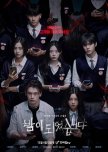
Terrifying.
And captivating at the same time.
Most peculiar.
First I wanted to quickly get out of it.
But then, somehow, I couldn't leave the girls and boys behind in their misery...
A nasty, cruel game with anguish and desperation.
And at the same time bitterly serious.
When bullying turns into a relentless, painful fight for survival...
An original but also creepy reckoning with the issue and impact of psychological and/or physical violence among teenagers.
Nurtured and inspired by what for some (far too many!) is real hell on earth.
In that sense: quite upsetting.
Therefore: ambitious and well done.
However: still scary.

The aura of this series is characterized by the inspiring world of the orchestra and its musicians
Be prepared: "Maestra - Strings of Truth" is impressively led by a highly concentrated Lee Young-ae and set in a refreshingly rare environment for a KDrama. Focusing on one of the very few, but highly talented, globally famous female conductors, the aura of this series is characterized by the inspiring world of the orchestra and its musicians. We also meet management lounges and the luthier´s workshop. Enchantingly, this maestra and her particular orchestral world offer a quite unique and mature flavour of series experience."Maestra - Strings of Truth" lives from the psychological depths and relationship dynamics of the main characters as well as the pathos of the world of classical music. Of course there are also intrigues, love, yearning for revenge and more, but the focus is on the maestra as a person in her struggle with herself, her passion for music and her life challenges.
For the FL, her love for music is at the center of her being and aspirations. As far as the men in her life are concerned, they would rather like things to be different. However, the maestra has a good reason why she has consistently dedicated her time to the orchestral world. And when it comes to her work, she is uncompromising. Above anything else, she is delivering a perfect performance. This is non-negotiable. Some people would prefer that to be different too...
For her role as maestra, Lee Young-ae completed several months of violin and conducting lessons. Her 'first violin', Hwang Bo-reum-byeol, also took eight months of lessons specifically for this purpose. Considering, there's a lot of passion involved in this KDrama, even before filming even started... and you can feel it.
By the way, the idea for the story did not grow on South Korean soil. It is a K-style remake of a French television series that focused on the career struggles of the very few women in this profession. (Only five percent of all conductors worldwide are female...) "Maestra - Strings of Truth" is dramaturgically heated up by a fatal love triangle with collateral damage and an even more fatal family legacy that the maestra would rather do without.
Intensive. Atmospheric. Thrilling, too.
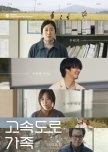
Thought-provoking KMovie, sailing close to the wind when it comes to duty of care and child welfare
The KMovie "Highway Family" is set at the bottom of the social pyramid in South Korea in the year 2022. It portrays a homeless family who seems to have found their own lifestyle at the country's highway rest stops. A happy family sleeping in a tent, living on scrounged money and having lots of fun together.That's one side of the medal. As audience, however, one cannot help but see the other side of the coin despite all the family idyll. The heavily pregnant wife has no medical support during what is now her third pregnancy. Her two children, being five and nine years old by now, miss out on any schooling. The parents claim that they do the teaching themselves, but reading, writing and maths are obviously not on their curriculum. A playground on the highway rest stops, which are heavily frequented by cars and heavy trucks, is dangerous, and the parents' duty of supervision is by no means guaranteed. The father is (as so often) the head of the family and objectively speaking, his decisions about the self-chosen outlaw family life sometimes border on violating his duty of care. Supposed (motorway rest stop) idyll and freedom may correspond to the father and his outlook on life. Wife and children, on the other hand, are now stuck in this boat. They love each other as a family and especially the children know no different. They rely on their father.
The KMovie sails close to the wind when it comes to moral issues concerning work, economy and society as well as duty of care and child welfare. Camps may form in the audience. And that is intentional.
The second protagonist, alongside the Highway family, is a married couple who lost their own child and who run a second-hand furniture store. Solid. Prosocial. Responsible. However, emotionally deeply wounded and unhappy.
Worlds clash. Two families meet. One is shattered deep inside, the other formally. Together they build something new - an alternative family patchwork, grounded in a rather simple normal life, which obviously doesn't have to be the worst, at least when kids are involved. Yet, can it be as simple as that? And at the disturbing end there is the question about the end of the story... which remains in the eyes of the beholder...
A thought-provoking KMovie.
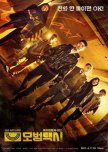
Being a victim in the face of injustice is the worst – revenge promises release of suffering
Dealing with some actual crimes in South Korea, "Taxi Driver" retells them from the perspective of the victims - a variation of vigilante justice is the driving force and explosive in the plot development. A lot of action is guaranteed. The pace is high. There's nothing tear-jerking about. Romance has no place here. However there is room for emotions.Although the crimes are extremely brutal and unscrupulous as well as the fights and chases don't sugarcoat anything - Taxis Driver is overall fun to watch (not in the sense of ´funny´ though!). On the one hand, this is because the perpetrators are caught and the victims actually get 'help'. On the other hand, and above all, it is the actors. Not only the team around Kim Do-gi, also and especially the individual villains in male and female versions. While on the one hand turbulent action fills the time (yes, for me personally less would have been more, but that's probably a matter of taste), it's actually the theatrical performance of the mimes that characterize the esprit of the series. The fact that Do-gi has to slip into new roles for his assignments has a certain charm - i.e. sometimes he mimes the inexperienced substitute teacher, sometimes the gallant, wide-legged criminal with a fur coat...
It's still quite a brutal TV serial. That's because of the cases. Yet they aren't invented. It helps that there is room for a pinch of humour, harmless situation comedy and a wink every now and then.
Despite all the vigilantism, which is the driving and fundamental premise of the entire series (and probably also of the 2nd season that is already planned), it is respectable: there is also a serious examination of justice/injustice, law/judiciary and the state's monopoly on the use of force. The brilliant public prosecutor Kang Ha-na in her idiosyncratic way and her team are excellently suited to this. The heroic deeds of the 'exemplary taxi crew' are thus not only whitewashed, but also rightly confronted. The script has in that sense hit a fine line that doesn't take away the joy of satisfaction, but still puts a question mark behind vigilantism, and thus gives credit to honest, committed and highly motivated law enforcement officers - because the country needs them. Vigilante justice, that should be clear, cannot and must not be the solution. (Human history is full of cultures of lynching and blood feuds - certainly this never did and will not promise a better world.)
And then: the heroes of the story are human beings, too. Flashbacks provide an insight into the taxi team's traumatic, formative past while tying them into current cases. They too are victims. On this earth there is probably hardly any person who does not have had the experience of being a victim in the course of their life - more or less traumatical. It is an ugly feeling, a deeply shameful experience, as it reminds mankind of its greatest weakness: the ultimate loss of control and helplessness inherent in the finitude of being, the inevitable surrender that sooner or later everyone awaits.
Accordingly, forgiveness and reconciliation are also a topic of this KDrama. However, this is ruled out as a serious option quite early on. A nice concept, yes, but rather not practicable, because people prefer to thirst for revenge. In this story, the emphasis is on the satisfaction of such. There are others, emphasizing that the pain doesn't go away with revenge. Because the fact remains: For a victim, the past cannot be reversed - in fact, the pain associated with it and the feelings surrounding it are rarely in the past anymore. They shape life from that moment on, become a part of it in the here and now. The experience cannot be erased or undone. In this respect, revenge on the perpetrator doent´t help either.
Taxi Driver gives less importance to this consideration. That's actually my only (but not insignificant) criticism. The series prefers to ride the obviously successful Speed&Action wave. Because otherwise that would have robbed the KDrama of the basis for the second season, so to speak. Consequently, they want to build on the success of the first. (Without Esom in the role of prosecutor Kang Ha-na, by the way, since she apparently left the actors´ crew due to other appointments.)
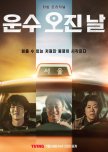
Absorbing & intense 500 minute road movie. A taxi ride to a soul´s nowhere. Brilliant from A-Z.
For me, “A Bloody Lucky Day” is one of the KDrama highlights of 2023.It is a psychological thriller. Without makeup. Set in a fairly grounded, solid, authentic everyday world, which gets challenged by a maniac´s incredible psychological logic. Stirring. Brilliant from A-Z.
However, everything revolves around the abysmal work of a psychopath. Accordingly, things get mercilessly brutal at times. The cumbersome police don't come off so well. Common sense, on the other hand, does... when it is in fact emotionally cornered to the extreme, so that it can no longer help but function at full speed, without distraction whatsoever.
One-pointed concentration, already having lost too much, getting your teeth into it and being ready to go to extremes – could that be the recipe to counteract the psychopathic 'monster'? Could... Maybe... Or not... Or is it?
“A Bloody Lucky Day” could be considered an absorbing ca. 500 minutes long road movie - a taxi ride to a soul´s nowhere. For the poor taxi driver a rather involuntary participant observation study on a psychopathic killer...
Emotionally highly explosive. Intense. Acting is first league. As a I mentioned earlier, a brilliant production from A to Z.
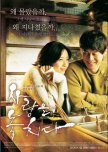
A homage to all those unhappily in love! (Wherever. Whenever.)
I´d say this is a homage to all those unhappily in love! (Wherever. Whenever.)Calm, like the water on windless days. Bare in words, instead told with images, well-placed scene settings and metaphors.
The protagonists are not so good with words, rather insecure and awkward when it comes to sharing their feelings. (But actually, nowhere in the movie is there any role model, whatsoever, from whom they could have learned better - how to deal with feelings openly, sincerely and appropriately.)
The original title was "Lost Love" or "Missed Love". But the international title “Lost in Love” is also appropriate, as the protagonists don´t seem to know how to navigate their feelings of love. This brings us back to the calm – becalm, with no wind to fill the sails. In fact, there is no tension between the protagonists - it is the drama of bad or missing timing in love. It is no coincidence that bus terminals become a structuring leitmotif.
The story of "Lost in Love" is not spectacular. On the contrary, it is the essence of a non-story. A story about a story that just doesn't want to happen. Nevertheless, it goes deep - because it relies on the effect of the blank, on the space between, on what works in the background and constantly gnaws at the heart. And this, actually, is an all too familiar, well known, painful experience for many people. It doesn’t have to be explicit. It is even more precise that way.
The KMovie has nothing to do with a typical RomCom. Nevertheless, "Lost in Love" is poetic in its own way - with an affectionate look at the unfortunate lovers on this earth: their hopes; their fear of self-confidently standing up for their feelings and thus maybe provoking the dreaded, outspoken “No!” or “Go!”; their inability to let go.
Water is the leitmotif in several ways. There is the rowing school and the fish farm representing dynamism and movement. And then there is the rain and the tears, shed or non-shed. But “Lost in Love” is also expressly colorful. With an eye for the banal details in everyday life. Authentic. Without makeup. The smell and the humid air of the monsoon summer are almost penetrating through to the audience. The landscape was handpicked, the radiant nature representing the beauty of life - even despite being unhappily in love.
The KMovie has its own idea of pacing. It develops its idiosyncratic charisma. It is the story about the non-love story, quietly told in a meandering way, as feelings are nothing one can be persuaded of... they can only be experienced... and, at best, shared... Or maybe empathized/sympathized with.
Immersive in its own way. Not for every mood. But if the timing (yes, again…) is right - for me it was a rainy autumn day - then (in my opinion) it's definitely worth seeing.
Others might say its dull and boring. Being from 2006, it is rather ´old´, too.
Well, check it out for yourself.
P.S.:
For the private lives of the ML and FL, though, it obviously worked out quite well.
They are married since 2009...
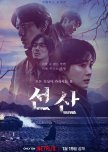
Slow paced. Gloomy. Solid crime thriller, set in a perhaps somewhat peculiar milieu
“The Bequeathed” is a dark and gloomy crime thriller that is set on the fringes of madness, obsession and shamanistic practices, taking place in a remote backcountry, where ordinary people have for generations been burying their dead under green burial mounds. It's not a horror story, but rather a solid, yet slow paced crime thriller, set in a perhaps somewhat peculiar milieu.There are only 6 episodes. Nevertheless, with only a little for the short time, comparatively much is revealed about a wildly mixed bouquet of different characters. A hodgepodge of astonishingly vividly drawn figures cross paths, take their space quite naturally and leave their traces with the audience. Against the background of the ongoing investigation into a series of murders, they all get the chance to clear up what they have (emotionally) left behind ... and move on.
I would not have expected this. Therefore I was positively surprised.
Authentic performance. Amazingly complex with haunting cinematic implementation. Dense. Suspenseful.
Nonetheless consistently gloomy. (It does get a little brighter towards the end though...)
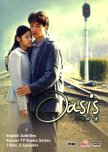
Close to the protagonists - format may be 'old', but script is round, coherent and flawless
I stumbled across "Oasis (2003)" or "Desert Spring" in the context of "Oasis" from 2023. I was curious if there were any parallels (besides the title). There are. Whether they are random or not, I don't know though. The 1940s/50s (in "Desert Spring"), like the 1980s/90s (in "Oasis"), are neuralgic phases of liberation from oppression in recent Korean history. HERE the last years of the Japanese colonial era and the Korean struggle for independence as well as the time under the occupying powers (e.g. USA) form the framework of the story, THERE the time of the dictatorship in the face of an increasing democracy movement. HERE it is radio, music and broadcasting, THERE film and cinema, that open up space for hope, visions, resistance and dreams. Here as there is a rival (who is HERE written more three dimensional than THERE) who refuses to see that the heart of his beloved already belongs to someone else. In both cases, the rival is on the side of power. In both cases the male protagonist is a talented but penniless young man who is in danger of getting underneath the wheels of the influential. Here as there, the female protagonist is a patent woman who knows what she wants.Apart from that, however, many things are different. In particular, the narrative style in "Desert Spring" is a lot more poetic, more visually impressive and with the camera emotionally closer to the protagonists than in "Oasis". Style and format may be 'old', but the script is round, coherent and flawless. HERE (more than THERE) the feelings (and struggles) of the two leads for each other take up most of the space. Almost the entire first episode tells the budding relationship between the two leads in impressive, emotional scenes with plenty of ambience of that time. The time from childhood to adulthood is sensitively sketched without many words. The sequencing and entanglement of events is suggested rather than worked out. However, the story is always close to the two young people who gradually come closer to each other over the years through a chain of coincidences. HERE the way to go is the goal. This was always against the background of Japanese colonial rule, the Korean followers on the one hand and the underground struggle for independence on the other. Music and radio form the context in which the two protagonists develop, prove themselves and finally meet and commit to each other as man and woman. But they don't live in a vacuum. For various reasons, Gi-hyun is a thorn in the eyes of the pro-Japanese collar & tie-wearers from the executive floor. Suddenly, Gi-hyun is on a red list. And even the end of colonial rule does not erase the past.
The KDrama only has three episodes, but they pack a punch. The third actually comes as a double pack with two hours. Impressively told, the story definitely leaves its mark. Even if the leads may not be so familiar to Western audience (compared to superstars from the newer KDrama productions), at least Song Il-gook has cult status in his own country, since "Jumong" at the latest.
A KDrama that uses creative means to reappraise a piece of bitter history in passing while telling a touching love story.
I stumbled across "Desert Spring" almost entirely by accident. Thanks to "Oasis" (2023) I found "Oasis" (2003). At this point, my sincere thanks go to the KDrama "Oasis" (from 2023), because without this reference to the namesake, the more than 20-year-old 'precursor' would certainly not have fallen at my feet.
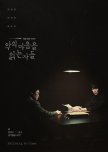
Facing the dark side of humanity. Slow Food for Thought. Intense. Powerful.
"Through the Darkness" takes an experimental approach within the crime genre. It is the serial adaptation of the autobiography of the first South Korean specialist in criminal psychology case analysis, Kwon Il-yong - about his pioneering work in the profiling of serial killers. His extensive research work was inspired by the methods of his American role model Robert Ressler of the FBI's Behavior Analysis Team, who also contributed to the introduction of the term 'serial killer'. The original title is "Those who read in the hearts of evil". Accordingly, the story essentially revolves around the approach of the young investigator to a 'new' form of criminalistic work: tracking down serial killers and their motives, backgrounds and intentions differs from the police work that was common up until then (1990s), since the selection of their victims appears at first glance to be arbitrary, motives are not immediately apparent and their 'gain' in the act is mainly of a psychologically peculiar nature. In order to be able to understand these psychological processes, a database of known psychological offender profiles first had to be created on the basis of comprehensive behavioral analyses. There is a lot of hard work behind it. It took a good decade before a separate unit for operative case analysis based on the American model could be created in South Korea, too - despite a great deal of opposition."Through the Darkness" is about approaching the darkest, most abysmal world of feelings and thoughts of the most brutal serial killers. While the story is also experimental in terms of pioneering the profiling itself, as far as KDrama goes, I mean mostly the way the real cases are processed and presented. There is no superficial plot about the story of the protagonists (let alone a romance). Nevertheless, relationships among colleagues develop over time. It is not 'suspenseful' in the sense of a thriller, because the perpetrators are always known in advance, at least to the viewers. Together with the investigative team, however, we set out to learn to understand the behavior in order to get a 'grab' for the investigation and arrest. This is quite fascinating and captivating. Inevitably, the viewers also enter the psychic worlds, which seem to be devoid of any humanity, and learn to grasp the pattern of loose threads.
In the beginning, the perpetrators were also just people (and not monsters). Not any longer though? When did something decisive change and why? The existential questions and the confrontation with his own darkness, which the protagonist is forced to face during his field research, do not go unnoticed by the viewers either. Kim Nam-gil embodies the lonely path of the profiler in a minimalist, haunting, and compelling way. Thrilling! But not exciting in the classic sense. Powerful. Deep. Slow Food for Thought. Highly valuable. But to be enjoyed in moderation (risks and side effects for the minds of those who 'read the hearts of evil' cannot be ruled out...).

A balanced mix of pleasant feel-good with sad life challenges and social grievances
"Castaway Diva" tells the story of a musically talented young girl with a very deep passion for a particular South Korean singer and her nationally acclaimed songs. “Castaway Diva” also tells the story of a lifelong childhood friendship.The plot summary implies a survival challenge with the promising scenario 'lonely girl for 15 years on a desert island'. Survival challenge may be the topic, but as far as the protagonist´s years alone on the island is concerned, the KDrama spends only a comparably short time on that aspect. It is rather about the (lifelong) challenge of ´some´ to survive their family burden...
'15 years on a lonely island' (however - don´t be mistaken - not in the South Seas or anything like that...) is a nice, original hook that once again introduces us to an attractive side of South Korea (in you like, there is a see side note below). Those years on the island basically form the cleverly knitted background for a firm, characteristically differing profile of a young woman who is intelligent, but comparatively not as consistently socialized in South Korean society and its strong traditions as the rest of the population. Due to her youth, which was for 15 years free of parental upbringing, school instruction and social comparison, yet inevitably well-grounded in everyday survival in the great outdoors, the protagonist brings refreshing clarity, simplicity and directness back to the modern lives of those around her in South Korea 2023. With her almost at the same time naïve and outrageous freedom in thinking and acting, the FL conveys independence and self-reliance in the midst of a society dominated by class, hierarchies and patriarchal family structures. In the midst of modern South Korean society, she hasn´t lost her authentic, creative spirit along the tiring path of competitive education while growing up. She is not, like so many others, gagged by acquired decency, and certainly not disillusioned or frustrated. She impulsively acts on instinct and follows her heart. This has worked for her so far, e.g. surviving her time on the island (and largely overcoming her childhood experiences, too.)
Within this framework, the KDrama is embedding the issue of domestic violence. In fact, this unfortunately still quite widespread, extremely sad problem is dramaturgically tackled in a resolute, rather offensive manner. This topic in its frighteningly powerful might is actually the source of the story´s suspension that runs through all 16 episodes in a tirelessly consistent, incredibly sticky manner…
And the music... yes, the music... This always becomes a balm for the soul. Even if competition in the music business might interfere here and there, music as such inevitably brings heart and soul together. The music brings light into the darkness. For the story overall it becomes the source of life force and healing, too. (Regardless, whether I personally dearly like the songs or not.)
So actually, “Castaway Diva” has quite something to offer. A KDrama that (for a change) isn´t set within the world of the fashionable upper class, and doesn't target the usual RomCom style (however, doesn´t dare to do without it either... well.). Instead, “Castaway Diva” is facing common life with its socially problematic issues in a fairly grounded way and in the process tells a likeable, bright story.
In would recommend "Castaway Diva", if you do not want it to be that intense, yet nonetheless some (easy to digest) profoundness is desired, too. Despite the commotion, with this KDrama an overall positive radiation prevails, i.e. thanks to the consistently positive charisma and straightforward demeanor of Park Eun-bin (- as well as Lee Re as young FL.)
I consider the heartfelt development dynamic of the relationship between the two women - the fan and her star – to be quite felicitous. As is the affectionate patch work family vibe. And always inspiring, the cheerfully thrown in bits and pieces of wisdom that life in nature (as opposed to school education) has taught the FL...
Overall, a balanced mix of pleasant feel-good with sad life challenges and social grievances.
-------------------------------------------------- -----------------
SIDE NOTE:
--- Stranded on one of the 1,000 islands in the southwest of South Korea (and NOT somewhere in the South Seas...) ---
In the Yellow Sea in the southwest of the South Korean peninsula, there are well over 1,000 islands of different sizes. Many of them are downright mini and not even inhabited. It might happen that no one sets foot on one of them for decades.
In recent years, between some of the larger inhabited islands bridges have increasingly been built. Yet, many of them can still only be reached by water. On the islands you can find an ecosystem with virgin forests, wetlands and mudflats that has remained largely untouched by modern human life to this day. Accordingly, this region of 1,000 islands, which extends to over 3,000 km², is now listed as a UNESCO biosphere reserve.
Life between ebb and flow is determined by agriculture and fishing. Thus life is simple, slow, and for some people rather boring. Accordingly, the young are leaving... and the region is overaging.
However, the gifts of nature offer pure abundance. Fishing is often done with bare hands. Mussels and crabs can be collected from the mudflats. Mung beans, soybeans, sweet potatoes, rice, chili and sesame grow abundantly. There are also a variety of findings you can collect on the beaches. You might literally stumble upon small and large treasures. For several centuries, trade with the West took the route through the Yellow Sea. After heavy thunderstorms, many ships have capsized over time up to this day. This is why the maritime region has now been officially listed as a historical site. Deep sea diving for treasures from the Song and Won dynasties of the Chinese Empire, which have been well preserved in shipwrecks in the salty mudflats, has therefore become quite popular. (The FL in "Castaway Diva", however, is more interested in the very mundane, modern flotsam that keep washing up on shore after thunderstorms...)


 9
9 37
37 15
15



















